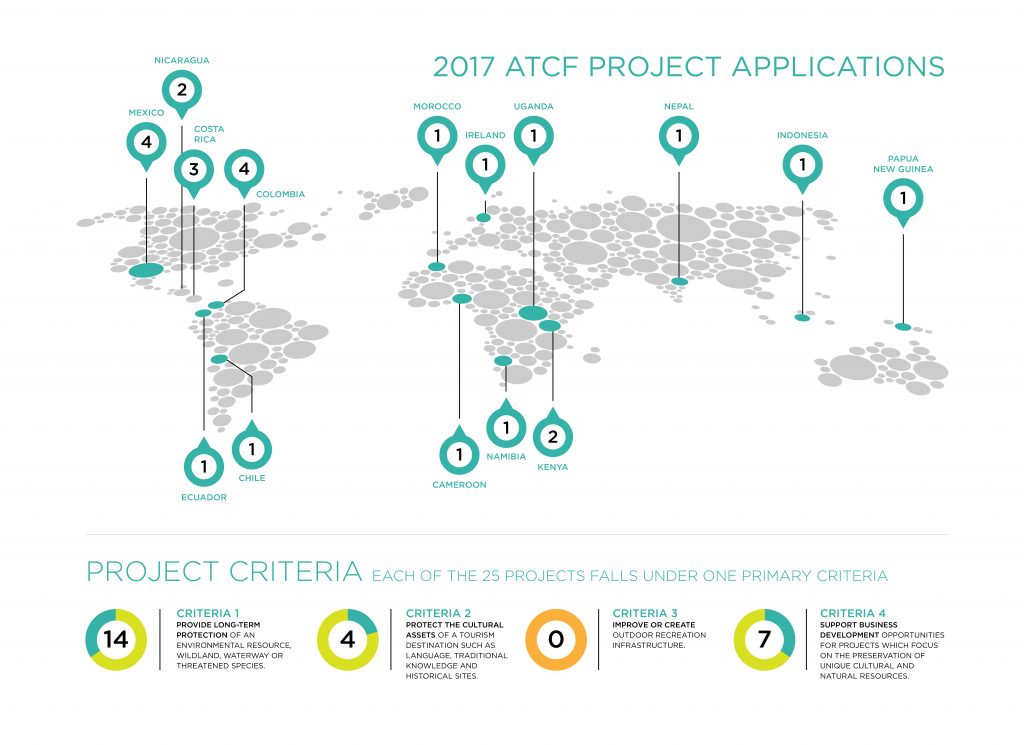By Christina Beckmann and Casey Hanisko
As membership in the Adventure Travel Trade Association (ATTA) has grown over the years, so has appreciation for the local challenges adventure travel tour operators face in their home markets. ATTA member companies are passionate advocates for environmental conservation, cultural preservation and celebration, and wildlife. Numerous “best practice” sessions at Adventure Travel World Summit events over the years have highlighted and provided information across a broad range of relevant topics intended to support tour operators working with communities and protect nature and wildlife.
Adventure travelers also seek tourism options that are environmentally conscious. According to ATTA’s 2017 Industry Snapshot, tour operators report the top activities in demand by travelers were hiking, ecotourism, cultural, and environmentally sustainable activities. Confirming what adventure tour operators are observing, a recent consumer study of more than 2,200 travelers conducted by Mandala Research reports 63 percent of all travelers say they are “much more likely” to consider destinations where there is a strong effort to conserve and protect natural resources. Travelers expect experiences that are sensitive to local communities, the environment, and wildlife, and it is often the smaller-scale projects in remote and rural destinations that can make a direct impact.
Not surprisingly, conservation tourism as a concept is becoming more understood and appreciated, and attracting support from diverse organizations around the world. As David Scowsill, former president and CEO of the World Travel and Tourism Commission, noted, “The next 20 years will be characterized by our sector fully integrating climate change and related issues into business strategy, supporting the global transition to a low-carbon economy, strengthening resilience at a local level against climate risks, promoting the value of responsible travel, and greening entire supply chains.” Furthering the point, the United Nations World Tourism Organization declared 2017 the International Year of Sustainable Tourism for Development as a way to “celebrate and promote the contribution of the tourism sector to building a better world.”
Yet, while the official recognition of tourism’s potential to support environmental, wildlife, and cultural goals is a milestone for our industry, funding for projects in these areas remains insufficient. A recent McKinsey study noted environmental-conservation projects need US$300 billion to $400 billion each year to do their work, but receive just $52 billion, mostly from public and philanthropic sources. Similarly, The Nature Conservancy’s chief economist Eric Hallstein noted, “The size and scope of our environmental problems — from water quality to deforestation and climate change — is increasing incredibly quickly around the world,” and an estimated $250 billion a year is needed to meet the world’s environmental challenges.
 The ATTA is pleased to join the impact-investment community, which combines the strength of the growing adventure tourism sector and its deep reliance on these natural and cultural resources with the mission of funding worthwhile projects. In October of 2016, ATTA, along with four other adventure industry leaders (REI, Uncruise Adventures, ExOfficio, and Eagle Creek), formed the Adventure Travel Conservation Fund (ATCF) with a mission “to protect threatened communities, cultures, and wild places throughout the world for their cultural, habitat, and recreational value.” The organization was recently accepted into 1% For The Planet, which connects for-profit companies committed to donating one percent of their revenue to a non-profit 1% For The Planet member organization.
The ATTA is pleased to join the impact-investment community, which combines the strength of the growing adventure tourism sector and its deep reliance on these natural and cultural resources with the mission of funding worthwhile projects. In October of 2016, ATTA, along with four other adventure industry leaders (REI, Uncruise Adventures, ExOfficio, and Eagle Creek), formed the Adventure Travel Conservation Fund (ATCF) with a mission “to protect threatened communities, cultures, and wild places throughout the world for their cultural, habitat, and recreational value.” The organization was recently accepted into 1% For The Planet, which connects for-profit companies committed to donating one percent of their revenue to a non-profit 1% For The Planet member organization.
The ATCF financially supports a variety of projects that align with specific criteria. For the ATCF 2017 grant cycle, 25 projects were submitted by members:
- Criteria 1: Provide long-term protection of an environmental resource, wildland, waterway, or threatened species. — 14 projects
- Criteria 2: Protect the cultural assets of a tourism destination such as language, traditional knowledge, and historical sites. — 4 projects
- Criteria 3: Improve or create outdoor recreation infrastructure. — 0 projects
- Criteria 4: Support business development opportunities for projects focusing on the preservation of unique cultural and natural resources. — 7 projects
Adventure Travel Conservation Fund is an impact investor along with organizations such as these:
The adventure travel industry has served as a leader in preservation and conservation, but there is clearly a lot more work to be done. The level of project funding for the selected projects will be directly correlated to the number of members of the ATCF. As of 28 July 2017, 52 companies were members, but the ATCF is actively seeking more members. These members financially support the funding of projects and will vote on the final projects in the last quarter of 2017.
“The life blood of the adventure travel industry is protected areas. National parks, reserves, sanctuaries, forests — these are the foundation of adventure itineraries,” said Keith Sproule, executive director of Abercrombie & Kent Philanthropy. “Many of us build not just our businesses, but our lives, around access to protected landscapes. ‘Freedom to roam’ as a principle is embraced in both our business marketing and our personal mantras. Conservation demands the same embrace. And not just a philosophic, virtual embrace, but proactive — budgeted — support with the goal of sustaining those green places on the map we hold sacred. It's an investment in the future.”
Every company working within the adventure travel industry is affected by conservation issues, and the ATCF elevates the power of many organizations to create a stronger, singular voice. “Will the loss of 96 elephants a day, global coral bleaching, 11 dams across one of the last transboundary free-flowing rivers, and clear cutting in the largest tropical rainforest threaten your business model?” asked Jim Sano, vice president for travel, tourism, and conservation at the World Wildlife Fund. “I’ll let you answer this question.”
If your company isn’t yet a member of the ATCF, joining will give your team a spot at the table when deciding which projects have the opportunity to make the biggest positive impact on the environment, within local communities, and throughout the destinations in which adventure travel thrives.

